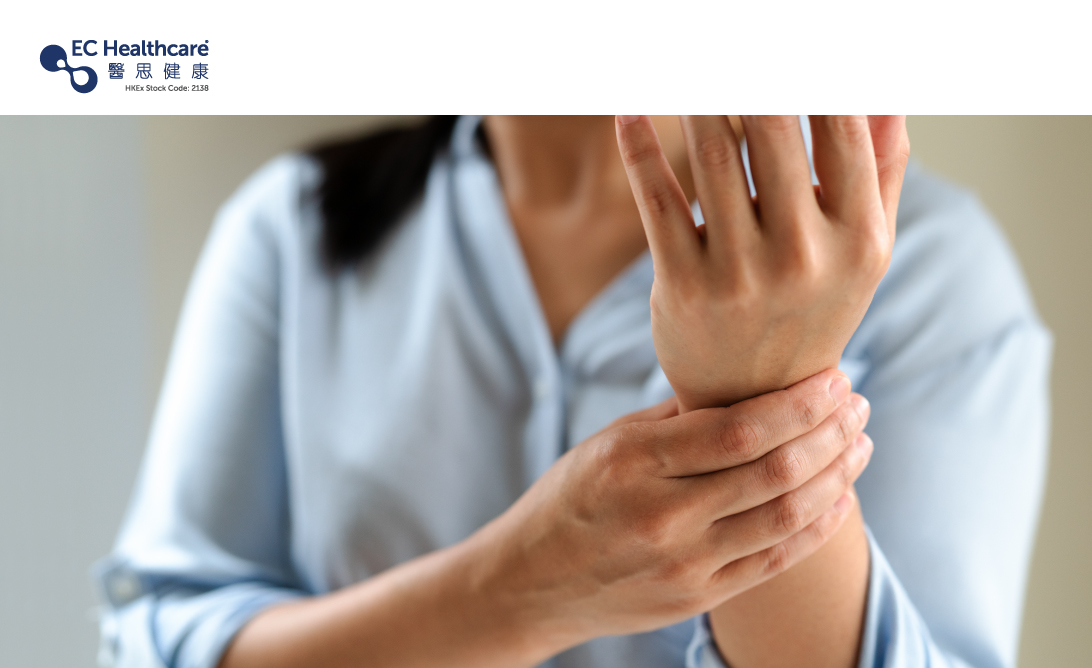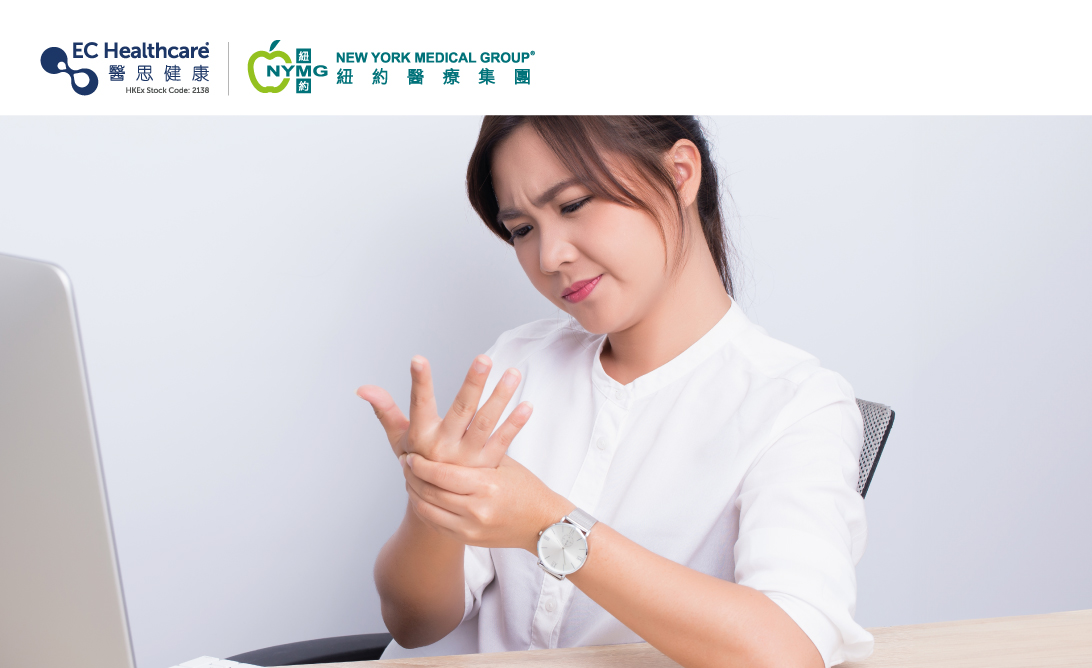Health Pulse: Mommy Thumb Is Not Exclusive to Moms


Q: What is mommy thumb?
A: "Mommy thumb" is a common term for “stenosing tenosynovitis" or "de Quervain's disease", which is a prevalent urban disease in Hong Kong.
Q: What are the causes and affected areas of mommy thumb?
A: The medical field is unsure about its exact causes, but most cases are caused by long-term overuse of the wrist and repeated wrist motion involving the radius and ulna. This triggers swollen tendon sheath on the radius side (the thumb side) of the back of the hand, compressing the tendons and synovium of the extensor pollicis brevis and abductor pollicis longus. The tunnel where the tendon slides becomes narrowed with inflamed and swollen tendons and synovium, causing pain in the thumb side of the wrist. In severe cases, tendon adhesion can occur, limiting the movement of the thumb and wrist.
Q: Who is particularly prone to mommy thumb? Does the name suggest that mothers are more prone to it?
A: Since the condition is commonly referred to as mommy thumb, it is mistakenly believed that only mothers or housewives are susceptible to this condition. In fact, the high-risk groups for mommy thumb are not limited to women or housewives, but also include new parents, individuals who use mobile phones or tablets for a long time, people who knit or sew for a long time, waiters, hairdressers, plumbers, office workers who use the mouse and keyboard for a long time, golfers, etc.
Q: What are the common symptoms of mommy thumb? What problems may occur in severe cases?
A: Patients will feel pain in the thumb side of the wrist, and the pain will intensify when the tendons are tightened while bending the thumb, rotating the wrist, making a fist, or gripping something. There may also be swelling on the thumb side of the wrist. If left untreated or not properly treated, the pain may spread to the entire thumb or the forearm. The pain can interfere with daily activities and work that require wrist motion, such as twisting a towel, using a mobile phone with one hand, typing, using a mouse, or even carrying shopping bags. Generally, the symptoms are most noticeable in the morning, and the pain will decrease after some activity. However, the pain will intensify again with repetitive movements of the thumb/wrist.
Q: How can we treat mommy thumb? Will it recur?
A: When you experience pain, you should seek professional medical attention as soon as possible for examination and treatment. Try to avoid repetitive wrist/thumb movements to allow the inflamed area to rest. If there is swelling, apply an ice compress to the affected site. Anti-inflammatory and pain-relieving medications can be used to alleviate the symptoms, while steroid injections may be used to reduce serious inflammation and pain. For severe cases, surgical intervention may be necessary.
In chiropractic care, a detailed examination is usually performed to rule out other conditions. Then, chiropractors will utilize manual therapy to correct misaligned joints and relax nearby muscles and soft tissues. Depending on individual conditions, cold/hot compresses, therapeutic ultrasound, radiotherapy, or shockwave therapy may also be used. Generally, with proper treatment and sufficient rest, the condition can greatly improve or recover within 1 to 3 months. However, if the patient does not rest properly, the condition can fail to improve and even recur later on.
Q: How can we prevent mommy thumb? Are there any recommendations for daily exercise? What areas should be strengthened to help prevent it?
A: To avoid the troubles caused by mommy thumb, prevention is better than cure. Apart from avoiding excessive and repetitive use of the thumb, you can also perform some stretching exercises from time to time to relax the relevant tendons.
Exercise 1:
Place your hand on a table with the palm facing up. Lift the thumb and little finger, and gently press the tip of the thumb against the tip of the little finger, creating a stretching sensation in the base of the thumb and wrist. Hold for 6 seconds, then relax. Repeat 10 times.
Exercise 2:
Extend your arm and make a fist. Bend the thumb into the palm of your hand and gently use the other hand to stretch the thumb and wrist downward, creating a stretching sensation in the thumb side of the wrist. Hold for 15 to 30 seconds, then relax. Repeat 2 to 4 times.
Q: Does using a mobile phone or tablet easily lead to mommy thumb?
A: When we use a mobile phone or tablet with one hand, we often use our thumb to touch the screen while fixing the other fingers and wrist to stabilize the device. In the long run, this can overwork the fingers and wrist, leading to conditions like mommy thumb or even carpal tunnel syndrome.
Q: Please share a case study.
A: This case features Mr. B, a 27-year-old plumber with mommy thumb. He has been working in this industry for about 7 years and he started experiencing mommy thumb in both hands two to three years ago. Due to the nature of his work, he often used various tools to repair and construct water pipes, which often involves intense twisting of the wrist and thumb. Plus, he enjoyed playing mobile games and rarely put his phone down during breaks. Gradually, he began to feel pain in the thumb side of his wrists. However, he did not seek medical treatment until one day when he experienced severe pain that made him unable to use his tools while working.
After a chiropractic examination, Mr. B was diagnosed with mommy thumb in both hands. After a three-month treatment course, Mr. B's pain had significantly improved, allowing him to resume normal work. However, about a year and a half later, Mr. B sought medical attention again, but the condition had become quite severe this time. Both his wrists were not only in severe pain but were also swollen. This was because Mr. B had recently undertaken a large-scale plumbing project that needed to be completed within six months. He had to work day and night without rest to meet the project deadline, and his mommy thumb recurred. As he could not afford to rest, he sought treatment from an orthopedic doctor who administered steroid injections for pain relief. His pain was reduced, but he did not follow the doctor's instructions to rest and continued to work intensively. Eventually, his condition worsened. His MRI report revealed severe wear and tear injury of both wrists, and the orthopedic doctor recommended surgical intervention. However, Mr. B was afraid of potential postoperative complications and decided not to consider surgery at the time. After completing the project, Mr. B immediately sought chiropractic treatment, but unfortunately, his condition had deteriorated too much to the point that he could not recover even after receiving treatment for a period of time. Therefore, Mr. B could only receive surgery and shift to a job in project management, and his condition finally improved.









